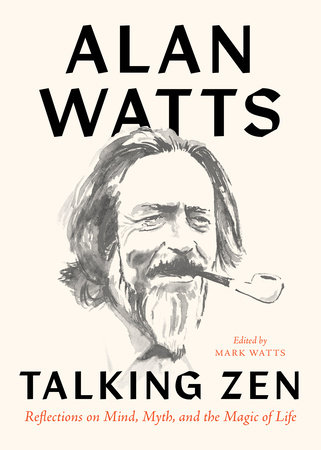
Alan and Zen are a natural marriage, as both challenge and tantalize everyone they encounter, particularly as the West sees things. He encourages us page after page to join him in opening our timeless minds, rousing us from a self-satisfied slumber comfortable in our own thoughts and ideas and views.
By David Jones
Is ancient Zen still relevant in the modern West?
How can teachers adapt their style to Western ears and minds, and how can these teachings help today’s seekers of Wisdom? Answers to questions like these are beautifully on display in this new book.
I received a review copy of Shambhala’s forthcoming book Talking Zen, by Alan Watts. This is an expanded edition of the 1994 book of the same title, and it’s a book I’ll be re-reading for enjoyment as much as for learning.
The book isn’t massive but there’s significant weight within: nine chapters of transcripts from some of Alan’s live discourses, ranging from the earliest known text of a talk from the early 1930s to a seminar segment he offered to an appreciative audience in 1971. It finishes with a presentation delivered during a benefit to raise money for the purchase of the Tassajara Zen Center in California in 1967.
The lectures were chosen and edited by Alan’s son Mark Watts, and the love of his work shines through.
I expected something more like a book of anecdotes or philosophical musings, and while the book has those they aren’t the book’s purpose. No, this is an opportunity to embrace many Buddhist teachings anew with Beginner’s Mind—particularly if we’re already comfortable with our understanding and views, because many modern Western Buddhist readers will be challenged.
Alan encouraged folks to take time to reflect on life with genuine wonder, something which he said was “the proper activity of philosophy and religion.”
He continued: “Yet these are almost hateful terms to those who think of philosophy as an academic splitting of hairs, and of religion as a stuffy moralism or literalistic mythology.” Indeed, he suggests they’re all just mankind’s efforts to express life’s uncanny mystery. He believed, as I do, that we all feel that pull of the grand mystery, no matter how we approach it.
His sense of wonder keeps popping up, his wonderment with life and how strange and uncanny it is, and how the best way to engage the mystery is to be open to it. He quotes a poem here:
When the bird calls
the mountain becomes more mysterious.
He brings psychology and education into the picture, suggesting we relate to everything through “frames” (what I call “labels”) and how Zen helps us recognize that we categorize and sub-categorize everything into smaller and smaller frames. Imagine seeing everything without the need for self-limiting definitions and traditional categories. Heady stuff!
The book is flowing, funny, and engaging, but it’s not merely light reading. Along with stories and poetry are the lessons of a skilled Zen teacher, helping us discover some teachings and rethink others. After one teacher-student story he asks, “What connection, what relation is there between the answer and the question? None at all.”
We’re invited to examine things others would rather we didn’t, things we’ve been taught are beyond question like religion or science or reasoning. As Alan explains, Zen “makes fun of logic. It turns metaphysics and theology upside down to make them look absurd.”
I love this book and the many ways Alan’s words invite us to peer beyond our traditional ways of seeing life and the universe and each other. It’s as warm and human and inviting as the teacher himself. I recommend it completely for anyone interested in a Western approach to Zen, no matter where they are along that path.
Alan and Zen are a natural marriage, as both challenge and tantalize everyone they encounter, particularly as the West sees things. He encourages us page after page to join him in opening our timeless minds, rousing us from a self-satisfied slumber comfortable in our own thoughts and ideas and views.
We can awaken to the universe as it ultimately is once we allow ourselves to. Alan Watts shows how Zen can help each of us along that journey.
Photo: Penguin Randomhouse
Did you like this post? You may also like:
Comments
- Mindful Appreciation of Wild Beauty - April 16, 2024
- This Does not Equal That: There is No Quick Fix - March 13, 2024
- Parenting as a Jehovah’s Witness and Regrets - March 4, 2024




